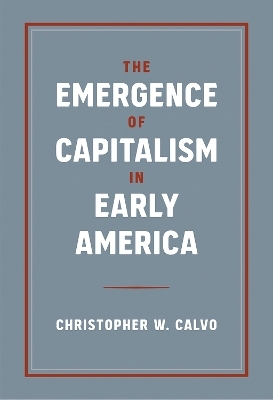
The Emergence of Capitalism in Early America
Seiten
2023
University Press of Florida (Verlag)
978-0-8130-8036-9 (ISBN)
University Press of Florida (Verlag)
978-0-8130-8036-9 (ISBN)
Provides a comprehensive history of the US’s economic thought from 1790 to 1860, tracing the development of a uniquely American understanding of capitalism. The book shows how American economists challenged, adjusted, and adopted the ideas of European thinkers such as Adam Smith and Thomas Malthus to suit their interests.
A comprehensive history of economic thought in the United States from 1790 to 1860
Due to the enormous influence of Adam Smith's The Wealth of Nations on Western liberal economics, a tradition closely linked to the United States, many scholars assume that early American economists were committed to Smith's ideas of free trade and small government. Debunking this belief, Christopher W. Calvo provides a comprehensive history of the nation's economic thought from 1790 to 1860, tracing the development of a uniquely American understanding of capitalism.
The Emergence of Capitalism in Early America shows how American economists challenged, adjusted, and adopted the ideas of European thinkers such as Adam Smith, David Ricardo, and Thomas Malthus to suit their particular interests. Calvo not only explains the divisions between American free trade and the version put forward by Smith, but he also discusses the sharp differences between northern and southern liberal economists. Emergent capitalism fostered a dynamic discourse in early America, including a homegrown version of socialism burgeoning in antebellum industrial quarters, as well as a reactionary brand of conservative economic thought circulating on slave plantations across the Old South. This volume also traces the origins and rise of nineteenth-century protectionism, a system that Calvo views as the most authentic expression of American political economy. Finally, Calvo examines early Americans' awkward relationship with capitalism's most complex institution—finance.
Grounded in the economic debates, Atlantic conversations, political milieu, and material realities of the antebellum era, this book demonstrates that American thinkers fused different economic models, assumptions, and interests into a unique hybrid-capitalist system that shaped the trajectory of the nation's economy.
A comprehensive history of economic thought in the United States from 1790 to 1860
Due to the enormous influence of Adam Smith's The Wealth of Nations on Western liberal economics, a tradition closely linked to the United States, many scholars assume that early American economists were committed to Smith's ideas of free trade and small government. Debunking this belief, Christopher W. Calvo provides a comprehensive history of the nation's economic thought from 1790 to 1860, tracing the development of a uniquely American understanding of capitalism.
The Emergence of Capitalism in Early America shows how American economists challenged, adjusted, and adopted the ideas of European thinkers such as Adam Smith, David Ricardo, and Thomas Malthus to suit their particular interests. Calvo not only explains the divisions between American free trade and the version put forward by Smith, but he also discusses the sharp differences between northern and southern liberal economists. Emergent capitalism fostered a dynamic discourse in early America, including a homegrown version of socialism burgeoning in antebellum industrial quarters, as well as a reactionary brand of conservative economic thought circulating on slave plantations across the Old South. This volume also traces the origins and rise of nineteenth-century protectionism, a system that Calvo views as the most authentic expression of American political economy. Finally, Calvo examines early Americans' awkward relationship with capitalism's most complex institution—finance.
Grounded in the economic debates, Atlantic conversations, political milieu, and material realities of the antebellum era, this book demonstrates that American thinkers fused different economic models, assumptions, and interests into a unique hybrid-capitalist system that shaped the trajectory of the nation's economy.
Christopher W. Calvo teaches American history at Florida International University and Gulliver Preparatory in Miami, Florida.
Acknowledgments
Introduction: Capitalism and Antebellum Thought
Laissez-Faire in the American Tradition
Progress and Poverty: Malthus and Ricardo in America
The Crisis of Free Society: The Southernand Northern Reactionaries
An American Political Economy
Henry Carey, Nature, and the Destiny of Man
Liberalism, Republicanism, and Finance
Conclusion: The Old and the New in American Economics
Index
| Erscheinungsdatum | 04.09.2023 |
|---|---|
| Verlagsort | Florida |
| Sprache | englisch |
| Maße | 152 x 229 mm |
| Gewicht | 272 g |
| Themenwelt | Geschichte ► Allgemeine Geschichte ► Neuzeit (bis 1918) |
| Geisteswissenschaften ► Geschichte ► Regional- / Ländergeschichte | |
| Geschichte ► Teilgebiete der Geschichte ► Wirtschaftsgeschichte | |
| Wirtschaft ► Volkswirtschaftslehre ► Makroökonomie | |
| ISBN-10 | 0-8130-8036-3 / 0813080363 |
| ISBN-13 | 978-0-8130-8036-9 / 9780813080369 |
| Zustand | Neuware |
| Haben Sie eine Frage zum Produkt? |
Mehr entdecken
aus dem Bereich
aus dem Bereich
Europa 1848/49 und der Kampf für eine neue Welt
Buch | Hardcover (2023)
DVA (Verlag)
48,00 €
Giordano Bruno - ein ketzerisches Leben
Buch | Hardcover (2024)
C.H.Beck (Verlag)
29,90 €


